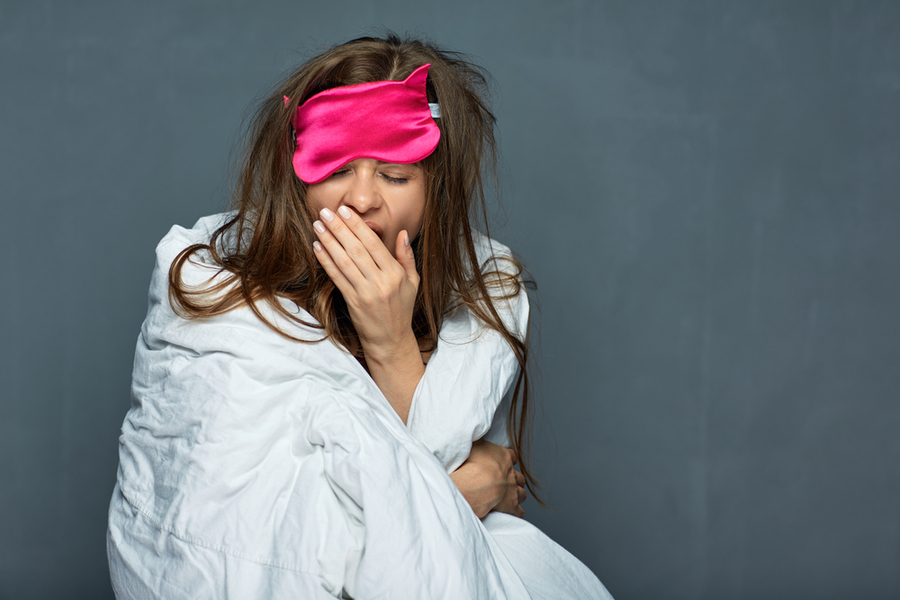7 reasons you’re tired all the time

Sleep has become a national obsession. In some circles, surviving on minimal rest is worn as a badge of honour – a testament to ambition and hustle. In wellness, it’s the opposite: the more sleep, the better – a sign of balance, health, and having your life together. A glowing, bag-free complexion is just a bonus.
That’s why it’s truly aggravating when, despite spritzing your lavender sleep spray and keeping your bedroom a digital-free zone, allowing you a dreamy eight hours or so (between seven and nine is ideal), you still wake up feeling groggy and drained.
We spoke to sports doctor Phil Riley to uncover what else could be causing those energy lows.
1. Stress
Stress can play a significant role in a disrupted night. Not only can it be hard to get those niggles out of your head, but it can also lead to poor hydration, excess caffeine, skipping meals, and grazing on unhealthy foods – all of which can negatively impact your sleep quality.
Try: Keeping a pad and pencil by the bed to jot down any thoughts that spring to mind. Offloading them can help you pick them up in the morning when everything often feels more manageable.
2. Caffeine
We know caffeine wakes us up, so why do we continue drinking tea and coffee into the afternoon? Caffeine has a half-life of about five hours, meaning it can linger in your system for over 10 hours, potentially disrupting your sleep patterns.
Try: Monitoring your caffeine intake and, if you don’t want to kick the habit, switch to decaf from mid-afternoon onwards. Remember, caffeine isn’t just in coffee – it’s also in tea, chocolate, and some medications.
3. Alcohol
While a nightcap might help you fall asleep faster, alcohol can disrupt your sleep cycle, leading to poorer quality rest. It can increase inflammation, cause dehydration, and raise the risk of cardiac arrhythmia, contributing to that inexplicable tiredness after a booze-fuelled lie-in.
Try: Reducing alcohol consumption before bed by switching to water or herbal teas towards the end of the evening. This can help improve sleep quality and overall well-being.
4. Exercising at the wrong time
Working out is essential for maintaining a healthy lifestyle, but timing matters. Exercising in the evening, especially high-intensity workouts, can interfere with your ability to get a good night’s rest. It takes about five hours for your body temperature, metabolism, and cortisol levels to return to normal after vigorous exercise.
Try: Opting for an invigorating morning session or, if that’s not possible, scheduling workouts earlier in the afternoon or evening. Light exercises like yoga or stretching closer to bedtime can also promote better sleep.
5. Eating the wrong things at the wrong times
Having a heavy meal before bed can make it harder to fall asleep, as your body is still digesting. Large meals can slow digestion and lead to stomach discomfort or acid reflux, causing disturbances during the night.
Try: Eating a larger, protein-rich breakfast to optimise cognitive function and keep you energised until lunch. Aim for smaller, lighter dinners to ease digestion and promote restful sleep.
6. Lack of regularity
Though freelance jobs and busy lives make the idea of a set ‘bedtime’ seem quaint, establishing a routine helps your circadian rhythm, allowing you to drift off at night and wake up naturally in the morning. This can help you avoid the jarring sound of an early morning alarm.
Try: Using a sleep journal to track when you go to bed each night and the time you wake up. This will help you map out your natural sleep cycle and determine the ideal time to go to sleep.
7. Keep your sleeping space for sleep (and maybe sex)
‘Sleep hygiene’ might be a bit of an overused buzzphrase, but the science is clear: using phones and laptops before bed keeps the brain from switching into snooze mode. The blue light emitted by screens can suppress melatonin production, making it harder to fall asleep.
Try: Leaving tech out of the bedroom and giving yourself time to wind down in a dark, quiet room before you want to go to sleep. Consider reading a book, meditating, or listening to calming music to signal to your body that it’s time to rest.
Beyond the pillow
If you’re getting your full eight hours and still feel foggy, it’s likely not just about how much you sleep – but everything that happens around it. What you eat, when you move, how you manage stress, and even the hour you hit the mat all feed into how well your body recovers. Sleep isn’t isolated. It’s stitched into your daily rhythm – and when one part is off, the whole thing can unravel. The good news? Even small tweaks to your routine can have a ripple effect. And the difference between dragging through your day and actually feeling rested might be simpler than you think.












